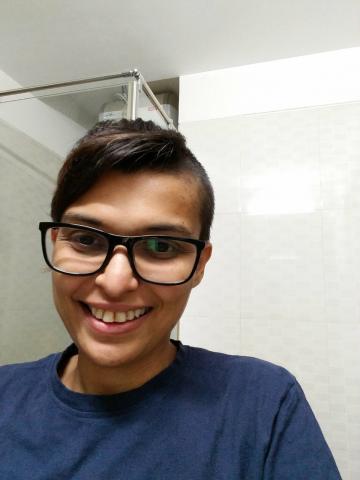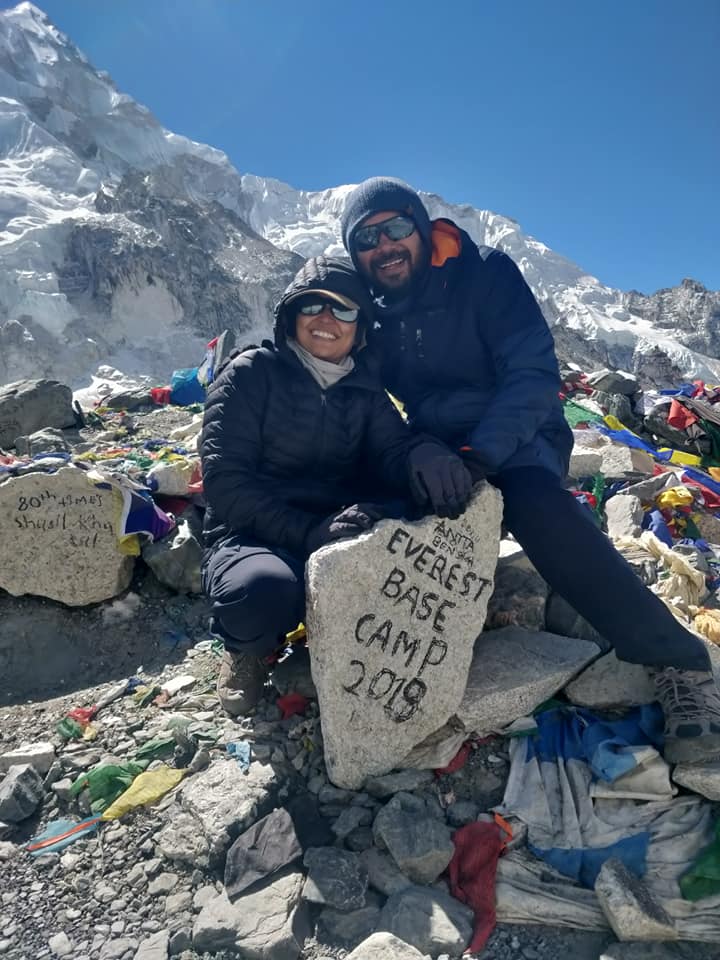
Tulsi Chikhal, 34 from Mumbai India on how she took the diagnosis of breast cancer head on, on dealing with chemotherapy, mastectomy and hair loss and side effects of Hormone Replacement Therapy and trekking to Everest Base Camp.
What is your diagnosis?
I was diagnosed with Stage 2 Breast Cancer in November of 2016.
Tell us about your journey
In summer of 2015, one day I felt a hard lump on my right breast. When I told a colleague of mine, she suggested I visit her Gynaecologist because I didn’t have one. The Gynaecologist told me it was fibroadenoma and asked me to keep an eye on it. If the size increased I could have it excised; she also prescribed Vitamin E pills and an Ultrasound. I got the ultrasound a few weeks later and the results confirmed that it was a benign growth. After a year or so, I could feel that the lump had increased in size, so this time I went to Kokilaben hospital near my house. The gynecologist there felt the lump and sent me to meet the Surgeon right away. The Oncology department Surgeon examined me and sent me off with a long list of tests to be done. A day later, the Ultrasound results again stated that the lump was benign, so I was rejoicing and resumed my work week. The following Saturday, the biopsy lab called me to come in but I insisted they email me the results. When I open the email, it said carcinoma. I didn’t know what that meant, so I googled the term. As breast cancer flashed on my computer screen, I immediately informed my boss and headed to the lab calling my husband on the way there. The diagnosis was unexpected. My husband, a grown man cried for the next 3 days, he was scared for the both of us. I disclosed it to my mom over tea, I was worried about her.
Surgery was the first line of treatment, with removal of the right breast in a procedure called Mastectomy. My surgeon said that if I opt for mastectomy, then I wouldn’t need radiation. At the time, I figured that a breast without the nipple wasn’t worth reconstructing. Then, a cousin of mine who was also diagnosed with breast cancer 3 months before me, told me about this procedure called Nipple-sparing reconstruction of the breast. I met the Plastic surgeon who explained that I was eligible for such a procedure since my tumour was a few cms away from the nipple. I remember some of my family members thought I should only focus on getting the tumor removed and not physical appearances. However, this was my life, my body; I decided to get the reconstruction with the nipple-sparing procedure.
The day before my surgery, I had a farewell party for my breast in my hospital room with my friends and family. I was wheeled into the OT listening to the Beatles and taking selfies. I wasn’t about to lose control of my life or feel depressed by this tumour! The surgery went well and I was happy to avoid painkillers and deal with the post-operative pain. I would willingly show my scars and reconstruction to all the nurses so that they would know and tell other patients about it.
Post-surgery, I was prescribed an Oncotype Dx test so that next line of treatment could be tailored for me. The test showed a high score of 45, which meant I had a higher chance of recurrence and Chemotherapy would be beneficial. My Plastic surgeon (who did my reconstruction) sat me down and explained all the possible side-effects and what I should expect. Since I had stated no interest in having children, fertility preservation was off the table. Better equipped, I decided to get the 12 cycles of Chemotherapy right away as suggested. I went and got a funky Mohawk haircut before my first Chemo! I was now in control of my hair instead of Chemo. Later when my hair started falling, I shaved it all off. I also bought an eye-brow and eye lash sparing ointment which was very effective.
I chose to share and include other people in my journey, so I started posting my experiences on social media. Soon, I had friends and their friends following this Chemo journey with me.

You Can Also Read: How To Cope Hair Loss During Chemotherapy
2 years after completion of my Chemo in 2019, I embarked on a trip to the Himalayas to see Mount Everest. I wanted to challenge myself; it was my search for my Everest. I believe, if you set your mind to do something, you can achieve it! Along with spreading awareness for Breast cancer, I wanted to tell people that you can’t let cancer stop you from living and achieving your goals. My husband and I did a 2 week trek and reached base camp successfully. 6 months before the trek, I started preparing myself with daily exercises such as walking, swimming etc. as prescribed by my Physiotherapist. Training was a difficult task but I was determined.

What is your present condition?
I am doing well. I now work 3-4 days a week as it can still get tiring to do long days. I am not ready to resume full-time work as before. I need to respect what my body has been through and cannot compare myself to others. I have realized that I need to do things at my pace.
Do you have a family history of your condition?
My mother’s sister had blood cancer and my first cousin (from mother’s side) has Breast cancer.
Were there any side-effects of the medicines? If yes, how do you manage them?
One of the surprising side-effects was loss of taste. I would find eating ice-cream similar to chewing on clay. Smelling the food before eating helped ease that. Joint pain, especially in my legs was very hurtful, notedly after the WBC injections. Daily massages helped a lot. I resumed work a whole month after Chemotherapy ended but it was tiring and exhausting to last the whole day. Many people think that once Chemo is over, the patient is supposed to bounce back but it’s not so easy.
How did you mentally/emotionally cope with your condition?
I never questioned “why me?”, because I felt if this is happening to me, there must be a reason. I feel like I now have a purpose in life as a Breast Cancer survivor who can reach out to other patients. Additionally, I want to live my life completely, do everything I want and do it now because tomorrow may be too late.
Who has been your biggest support/companion through it all?
My husband, my mother and my Plastic Surgeon have been my biggest supporters. I realized the importance of having amazing caregivers. Cancer can be a very lonely disease since the patient is expected to always stay indoors and stay from too many people. Video and Skype calls should be used profusely so the patient doesn’t feel isolated.
What were some of the challenges you faced and what is your advice to patients who face similar challenges?
Taking the massive injections of Zolodex in my stomach area every 3 months is the most emotionally and physically taxing challenge for me. Zolodex is a type of hormone therapy that prevents the ovaries from making estrogen, which is a key growth stimulator for some breast cancers. It is agonizing, causes low moods and severe hot flashes almost daily. Even at -5oC in the Himalayas (during my trek), I was sweating and would wet all my clothes. My doctor did suggest anti-depressants but I refused them and started organic curcumin pills. Switching to organic milk concurrently has helped.
What keeps you awake at night?
Nothing, I am not someone who is afraid of dying!






